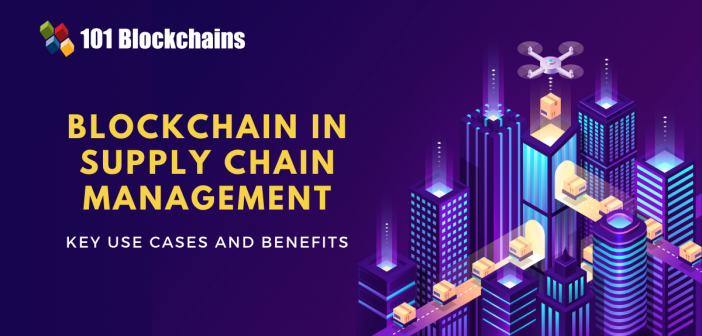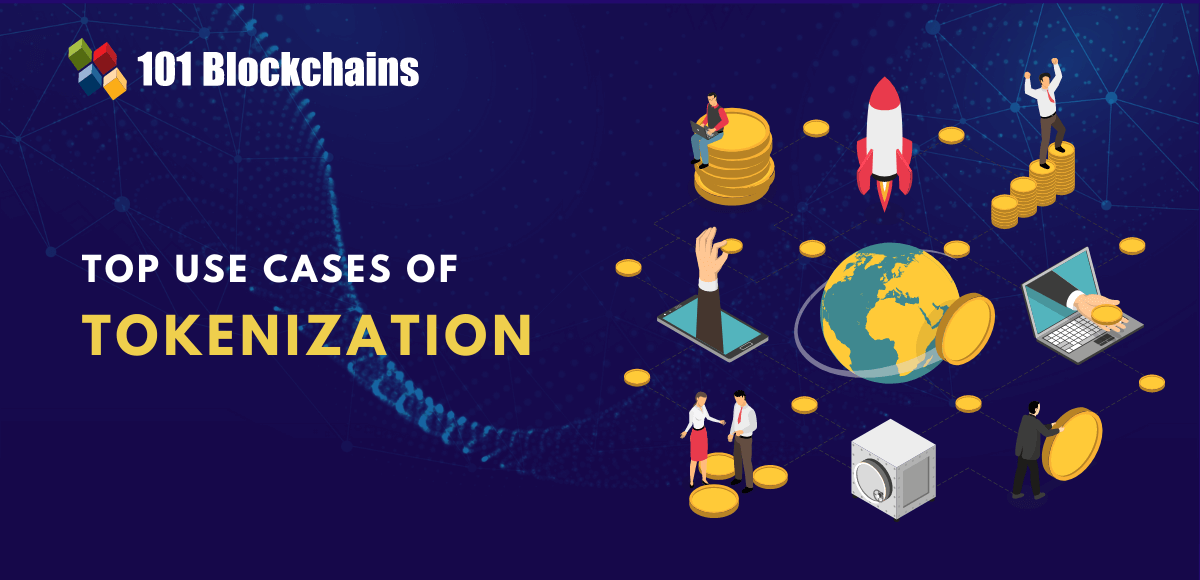Learn how blockchain truly works, master key definitions, and uncover what makes smart contracts so "smart." Dive into the fundamentals, gain valuable insights, and start your blockchain journey today!

- Analyst Corner
Diego Geroni
- on May 13, 2021
Key Use Cases and Benefits of Blockchain in Supply Chain Management
Do you want to trace the origins of your mobile phone? Or, do you want to know about the place where your favorite clothes come from? The stores selling these products to you are a part of a huge supply chain that starts from the place of collecting raw materials. All industries have their own model of supply chain operations that involve planning and execution of different processes involved in obtaining finished products.
Basically, different entities, organizations, technologies, resources, and businesses come together to manufacture a product alongside ensuring that it reaches the points of distribution. So what are the benefits of blockchain in supply chain management? Blockchain has emerged as one of the latest technological interventions and has found promising applications in the development of decentralized solutions. On the other hand, it is reasonable to think whether blockchain could revolutionize supply chain management all over the world.
Many people think that setting up a supply chain and its implementation is a very easy task, and a few simple steps could help you get the job done. However, planning, implementation, and maintenance of a supply chain is highly hectic in practice when compared to concepts and planning.
Businesses have to take various factors into account for effective implementation of a supply chain with advantages such as improved quality, better sales and revenues, faster production, and lesser frauds as well as overhead costs. On the other hand, the supply chain has to expand according to the growth of a business while ensuring the same levels of interconnectivity among various elements integrated into the supply chain.
The use cases and benefits of blockchain in supply chain management are largely responsible for dealing with complicated record-keeping tasks and product traceability. Blockchain technology has enabled a promising alternative with better automation to ensure centralized database administration for the supply chain management.
Excited to learn about the supply chain in blockchain? Enroll Now in Enterprise Blockchains and Supply Chain Management Course
Why Do You Need Blockchain for Supply Chain Management?
Now, many people would think of the possible reasons to bring in blockchain for supply chain management. In order to understand the benefits of using blockchain in supply chain, it is important to know the existing status of supply chain management. There is no doubt that the management of modern supply chains is highly complicated and involves a lot of effort.
Logistics giant, Maersk, has stated that a particular shipment of refrigerated products could move through almost 30 people and organizations, with over 200 interactions, during its journey from East Africa to Europe. The most important trait of productive supply chains refers to strong, transparent, and end-to-end communications throughput geographically distributed partner ecosystems. However, existing supply chain strategies don’t favor transparency and present various complexities, thereby calling for interest in the use cases of using blockchain in supply chain management.
According to Forbes, the modern supply chain is highly fragmented and is not just a linear and sequential chain starting from the raw material to the final product anymore. Now, supply chains comprise a multi-tiered ecosystem that includes suppliers, partners, and consumers working together in unison.
In addition, the multi-region, multi-industry, and multi-geography traits of the modern supply chain also give rise to further complexities. The perspective of Forbes on the modern supply chain also points out the difficulty for consumers in verifying the value of products due to a substantial lack of transparency in the existing system.
As a matter of fact, there is no possibility for investigating supply chains if there is any hint of unethical or illegal practices. Therefore, the modern supply chains have to face issues of limited visibility and transparency alongside a lack of trust among participants. The benefits of using blockchain in supply chain management largely revolve around addressing these problems effectively.
How Is Blockchain Suitable for Supply Chain Management?
Blockchain is basically a digital ledger or decentralized database that has the capability to store information. The ledger keeps a record of the different transactions in the form of a series of blocks associated with each other in the form of a sequence in the chain. The ledger is present throughout different computers, and every record of the ledger is updated for every modification in the blockchain.
The most important trait that favors the use cases and benefits of blockchain in supply chain management refers to immutability. There is no way to alter data on a block once it has been added to the chain, thereby providing a single source of truth for all transactions. As a result, using blockchain in supply chain management could enable better and comprehensive verification and audit of transaction flow.
Subsequently, enterprises could ensure that supply chain transactions are secure and correct with the help of blockchain. For example, companies could monitor all parts of their logistics without relying on third parties or intermediaries. Blockchain enables organizations to work in ‘zero trust’ environments for their supply chain management routines.
Build your identity as a certified blockchain expert with 101 Blockchains’ Blockchain Certifications designed to provide enhanced career prospects.
What are the Benefits of Blockchain in Supply Chain Management?
Blockchain technology and the flexibility for programming business logic by using smart contracts could provide distinct advantages. First of all, it can facilitate improved accuracy in asset tracking. Secondly, the applications of blockchain in supply chain management provide better transparency regarding ownership of consumer goods starting from source point to end-user consumption. Most important of all, the use cases of blockchain in supply chain management also support advantages of better licensing of products, software, and services.
Supply chains can leverage the power of blockchain for effective improvements in efficiency alongside ensuring auditable tracking and limits on malicious behaviors. In the logistics industry, paperwork is responsible for around half of the transport cost. In addition, the supply chain also experiences many issues, such as mislabeling of seafood.
Another example refers to the sourcing of mica from illegal mines through child labor, which in turn is used for makeup, automobile paint, and electronics. At the same time, enterprises also have to encounter the concerns of counterfeit products and fraud, particularly in the sectors of consumer goods such as luxury brands, pharmaceuticals, and electronics.
According to a report by PwC, over 2% of the total global economic output comes from counterfeit product sales. Therefore, the use of blockchain in supply chain management could introduce the benefits of traceability, transparency, accountability, and tradability.
Blockchain has the capability to achieve cost efficiencies and performance improvements through better traceability, tradability, and transparency. The use cases of using blockchain in supply chain can lead to better traceability, which enables better operational efficiency through mapping and visualization of enterprise supply chains.
Blockchain helps consumers understand the supply chain of an organization effectively and engage with the brand. Tradability is another notable aspect of blockchain that can revolutionize supply chain management. Blockchain enables tokenization or dividing a particular asset into different shares that provide a digital representation of ownership.
In addition, transparency on blockchain supports the collection of key data points in the supply chain, including claims and certifications. Most important of all, it is easier to verify the authenticity of key data points alongside ensuring real-time updates. So, where do you see the maximum impact of the benefits of blockchain in supply chain management?
Watch the on-demand webinar on blockchain in supply chain to learn how enterprise blockchain-based applications enable scalable solutions
-
Product Traceability
Global supply chains have to offer support for almost anything, including consumer packaged goods as well as product recalls. In some cases, brands have to recall consumer products or raw ingredients for avoiding illnesses or injuries. However, recalls on consumer products can result in negative impacts on millions of individuals all over the world.
When you look at ‘what are the use cases of blockchain in supply chain?’ you would find streamlined product recall alongside reduced counterfeiting for improved product traceability. Recalls could be less expensive with better efficiency in cases where manufacturers could locate the affected products easily.
The transparency in the supply chain allows for faster and efficient recalls. Blockchain helps in verifying accurate and ethical sourcing of a product, thereby preventing the concerns of counterfeiting. The immutable nature of blockchain enables transparent verification of certifications, legal documents, and other records.
-
Supply Chain Transparency
The next important answer to ‘what are the benefits of blockchain in supply chain management?’ refers to better transparency. Blockchain allows process tracking alongside reporting and regulatory compliance. According to estimates, using blockchain in place of conventional processes can result in the growth of trade volumes. Blockchain offers the ability for tracking digital or physical products throughout their lifecycle. It also presents the potential for adapting to ethical and sustainable production and consumption of any product globally.
Blockchain introduces transparency in process tracking, thereby enabling manufacturers with a bird-eye perspective of their value chain. Blockchain can help in tracking the movement of assets alongside recording the information and showcasing previous asset records. Another promising benefit of using blockchain for supply chain transparency refers to improved regulatory compliance and reporting. The facility of accurate, relevant, and unaltered information to stakeholders in real-time could improve corporate governance. It can also ensure the seamless distribution of data to the ideal stakeholders.
-
Tradability in Supply Chain
Blockchain use cases in supply chain management could also improve efficiency in ownership and licensing. The verification of past ownership through standard licensing procedures can be crucial for various industries. In addition, blockchain could also leverage automated smart contract payments for accurate licensing of services, software, and products. The facility of consensus is one of the prominent benefits of using blockchain in supply chain management. Every entity on the blockchain has the same version of the ledger, thereby helping with better opportunities to track ownership.
What Are The Use Cases of Blockchain in Supply Chain Management?
With so many credible benefits of blockchain in supply chain management, it is reasonable to wonder about the applications. Examples of different use cases of using blockchain in supply chain management could help you in understanding its significance.
-
Maersk and TradeLens
Maersk came up with its unique blockchain-based shipping platform TradeLens on the IBM Blockchain in 2018. The IBM Blockchain utilizes an open-source Hyperledger Fabric codebase offered by the Linux Foundation. Enterprises have the flexibility of integrating existing in-house systems with TradeLens by leveraging open APIs and connecting seamlessly to multiple supply chain partners.
In addition, TradeLens can also facilitate the real-time exchange of data and important electronic documents. By the end of 2019, more than 100 organizations, with many of them being large ocean carriers, have already joined TradeLens.
-
Blockchain and Food Safety
Another prominent mention among answers to ‘what are the use cases of blockchain in supply chain?’ points towards food supply chains. The perishable nature of goods in food supply chains is the foremost concern for enterprises in the sector. Therefore, businesses look forward to better traceability by blockchain for supporting good health and saving lives alongside time and money.
Contaminated food is responsible for almost 420,000 deaths in a year, and food businesses have to comply with various regulations. So, ten leaders of the food industry such as Walmart, Nestle, and Unilever have collaborated with IBM for creating the Food Trust network.
Now, the Food Trust network, powered by Hyperledger Fabric, has over 80 companies on board. Walmart has also implemented two blockchain pilot tests, one for tracking sales of mangoes in the US and the other for tracking the movement of pork in China. The conclusion of both pilot tests provided verification for the ability of blockchains to facilitate effective quality control in the supply chain.
Do you want to know how to use Hyperledger Fabric? Check out our thorough Hyperledger Fabric guide now.
Bottom Line
On a final note, it is clear that the use cases and benefits of blockchain in supply chain management improve trust. Blockchain empowers consumers to know more about the value chain of a business. In addition, businesses could reduce the costs and overheads associated with their supply chain operations through better transparency.
The ability to pinpoint the exact point of failure with blockchain can help in saving a lot of time and resources. Furthermore, it is also essential to note that blockchain provides better transparency that is essential for modern supply chains. Learn more about the applications of blockchain in supply chain management and explore the advantages now!
*Disclaimer: The article should not be taken as, and is not intended to provide any investment advice. Claims made in this article do not constitute investment advice and should not be taken as such. 101 Blockchains shall not be responsible for any loss sustained by any person who relies on this article. Do your own research!






